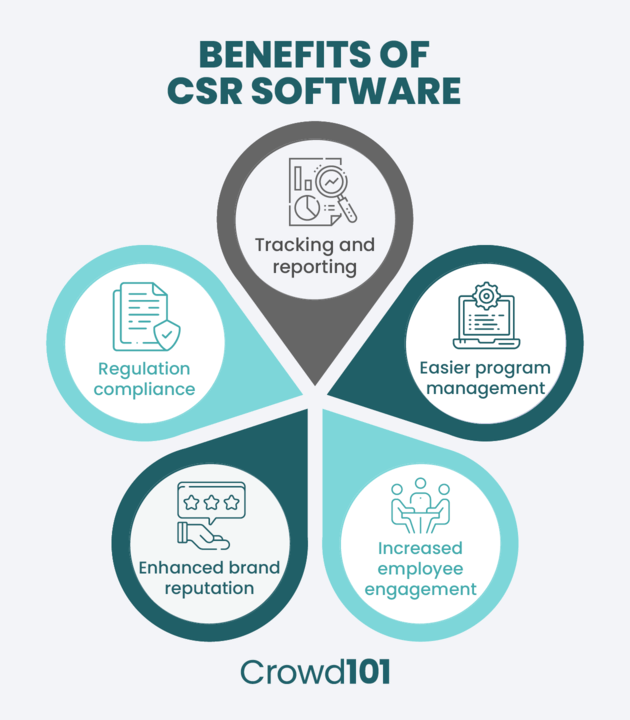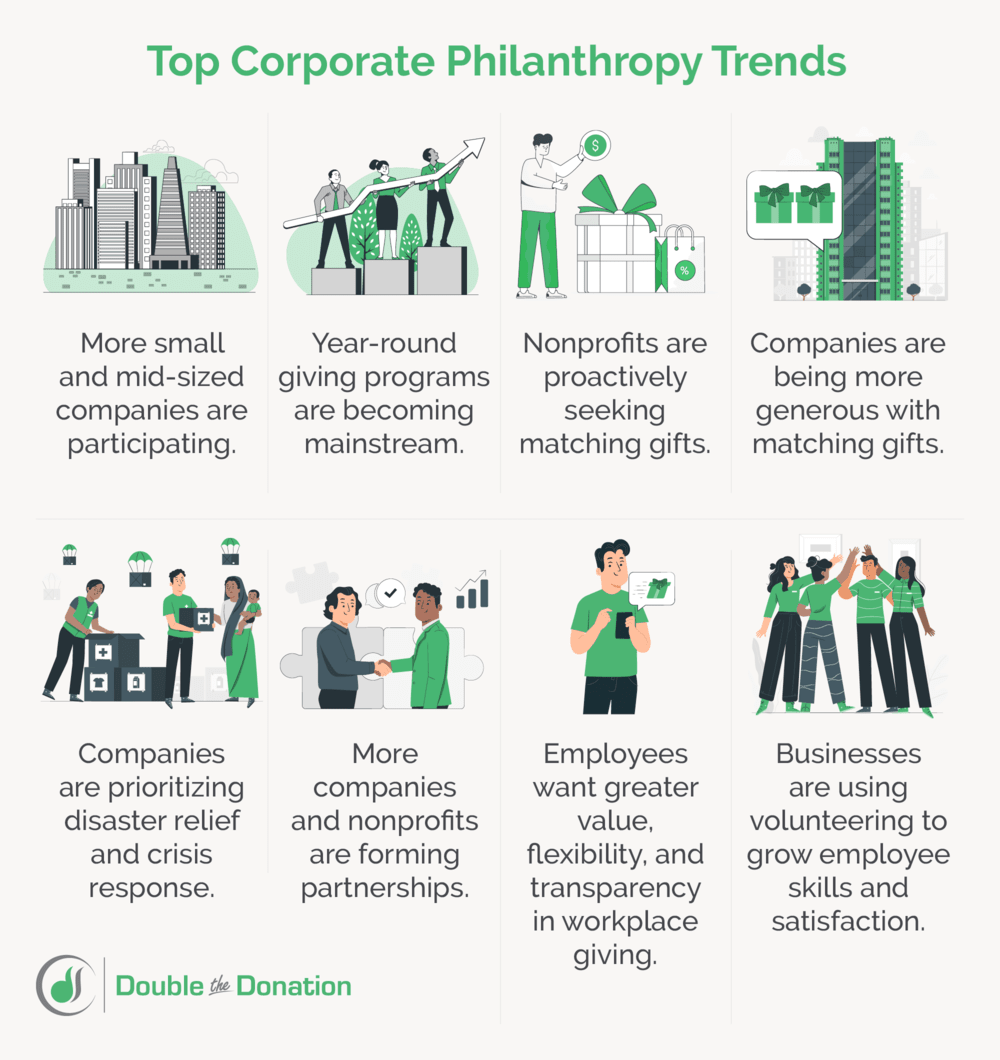15 unexpected ways corporate philanthropy initiatives elevates communities
Wiki Article
Checking Out How Company Philanthropy Shapes Brand Online Reputation and Customer Commitment
Company philanthropy greatly affects brand name track record and customer loyalty. Firms that take part in genuine charitable efforts usually see a favorable change in exactly how consumers perceive them. This alignment of values promotes count on and emotional links with target markets. The performance of these kind efforts can vary substantially. Recognizing what genuinely resonates with consumers is vital for brands seeking to boost their social impact and market setting. What techniques will emerge as important for future success?The Evolution of Company Philanthropy
As companies increasingly identify their duty in society, the development of company philanthropy has transformed from mere philanthropic donations to a strategic part of brand identification. At first, firms involved in philanthropy primarily for tax obligation benefits or to boost their public image. Over time, this strategy shifted as stakeholders-- consisting of staff members, financiers, and consumers-- required a much more genuine dedication to social duty.Organizations began aligning their philanthropic efforts with their core worths and company purposes, resulting in more thoughtful and impactful contributions. This change has actually motivated companies to spend in sustainable practices and community advancement, promoting a sense of function that resonates with customers.
Technological innovations have promoted transparency and involvement, permitting businesses to showcase their kind efforts a lot more efficiently. Company philanthropy has arised as an important part of business technique, with organizations welcoming the opportunity to positively affect society while enhancing their total brand name narrative.
The Effect of Philanthropy on Brand Understanding
While companies take part in humanitarian efforts to promote social excellent, these initiatives substantially shape brand name understanding amongst consumers. Corporate philanthropy can boost a brand's image by linking it with positive social influence and neighborhood participation. Customers often regard brands that proactively participate in philanthropic activities as more trustworthy and responsible. This assumption can affect purchasing decisions, as customers may prefer brand names that show a dedication to social concerns.
Structure Emotional Links Via Providing
Business philanthropy acts as an effective device for boosting brand name identification by connecting company worths with area demands. Via calculated providing, companies can foster neighborhood interaction and produce common values that resonate with customers on a psychological degree. This technique not just reinforces brand name reputation but also builds lasting connections between services and their stakeholders.Enhancing Brand Identity
When business involve in philanthropic efforts, they not just contribute to social excellent but additionally build deeper psychological connections with their audiences. By aligning their brand name with philanthropic causes, firms boost their identification and signal worths that resonate with customers. This positioning creates a story that surpasses product or services, inviting customers to get involved in a common goal. As customers increasingly focus on purpose-driven brands, companies that actively participate in giving can differentiate themselves in a crowded market. Such campaigns promote a feeling of commitment among customers that feel directly connected to the brand name's values. Inevitably, corporate philanthropy comes to be an essential tool for enhancing brand name identification, cultivating long lasting partnerships based on common ideas and emotional involvement.Fostering Neighborhood Engagement
Countless researches suggest that business participating in community-focused humanitarian campaigns can substantially reinforce emotional connections with their stakeholders. By buying regional projects and supporting social causes, services grow a sense of belonging and trust within the neighborhood. This involvement fosters a positive brand picture, as consumers value companies that demonstrate authentic problem for societal problems. In addition, staff members usually feel much more inspired and honored to be linked with an organization that prioritizes area well-being. As an outcome, customers are more likely to establish commitment in the direction of brand names that proactively add to meaningful causes. Inevitably, cultivating community interaction via philanthropy not only enhances brand name track record however likewise constructs lasting psychological connections that profit both the business and the community it offers.Creating Shared Values
Exactly how can organizations effectively create shared worths that reverberate with their stakeholders? Firms can achieve this by aligning their humanitarian efforts with their core objective and the rate of interests of their areas. By engaging in efforts that deal with local requirements, services cultivate emotional connections with customers, boosting brand commitment. Partnering with non-profits that reflect shared worths strengthens the brand name's picture and demonstrates dedication to social obligation. In addition, transparent interaction concerning these initiatives permits stakeholders to see the substantial effect of their contributions. Eventually, by incorporating shared values into their company philanthropy, business not only enhance their online reputations however also cultivate lasting partnerships with customers, causing enhanced commitment and count on. This positioning is necessary in modern customer decision-making.Situation Researches: Effective Philanthropic Campaigns
Checking out effective philanthropic projects exposes numerous approaches that improve brand reputation. Impactful area campaigns, ingenious partnership versions, and long-lasting engagement approaches have proven efficient in cultivating positive links with consumers. These instance research studies highlight the relevance of thoughtful corporate giving up attaining both social and service purposes.Impactful Community Initiatives
Several companies have effectively leveraged philanthropic projects to enhance their brand credibility while making a purposeful impact in their neighborhoods. An innovation company released a digital proficiency program in underserved neighborhoods, supplying training and resources that equipped local citizens. This campaign not only added to neighborhood advancement yet also positioned the business as a socially accountable leader. A major food firm applied a cravings relief campaign, partnering with neighborhood nonprofits to disperse meals to households in requirement. This effort reinforced community connections and cultivated customer loyalty. Through these impactful initiatives, business have actually demonstrated their dedication to social duty, efficiently straightening their brand name worths with the needs of the communities they serve, inevitably enhancing their total reputation.Cutting-edge Collaboration Models
The success of impactful area campaigns often rests on cutting-edge partnership designs that combine diverse stakeholders to address complicated social difficulties. Situation researches show how corporations, non-profits, and federal government entities can team up properly. A multinational corporation partnered with a neighborhood non-profit to launch an education and learning program, merging resources and proficiency to boost neighborhood proficiency prices. Another instance involved a technology business and a health care company joining forces to establish a telemedicine remedy for underserved populations. These collaborations not just amplified the reach of humanitarian initiatives yet likewise enhanced the brand names' online reputations by aligning their missions with neighborhood demands. Inevitably, innovative partnership versions offer as a catalyst for meaningful change and foster stronger connections between brand names and their consumers.Long-lasting Involvement Methods

Gauging the ROI of Company Social Duty
As business increasingly buy business social responsibility (CSR) initiatives, understanding the return on financial investment (ROI) related to these initiatives ends up being crucial. Gauging ROI in CSR is complex, usually incorporating both measurable and qualitative metrics. Financial returns can be evaluated through raised sales, boosted brand name loyalty, and improved worker morale, which can bring about higher performance. Furthermore, firms may analyze price savings connected to lasting methods, such as reduced waste or power usage.Qualitatively, the influence of CSR on brand track record can be evaluated with consumer understanding researches and social media sites sentiment analysis. Surveys can offer understandings right into how CSR activities affect customer commitment and trust fund. Benchmarking versus industry criteria can help companies assess their CSR effectiveness - corporate philanthropy. Eventually, an extensive strategy to measuring ROI makes it possible for companies to make enlightened decisions regarding future CSR investments, lining up methods with both financial efficiency and social influence
Consumer Expectations and Company Responsibility
Progressively, customers expect business to run with a strong feeling of corporate obligation, viewing honest methods as a prerequisite for brand name commitment. This change in assumption mirrors an expanding recognition of social and ecological issues, leading customers to favor brands that line up with their values. Consumers are more inclined to sustain firms that participate in transparent practices, demonstrate sustainability, and contribute positively to their neighborhoods.Moreover, social media sites enhances these assumptions, allowing customers to share their viewpoints and experiences swiftly. Brands that stop working to meet these moral standards run the risk of reaction, while those that embrace business responsibility typically appreciate improved reputation and client commitment. As consumers require accountability, business need to integrate company social obligation into their core strategies, focusing on click here moral behavior not equally as an advertising and marketing approach, yet as a fundamental facet of their operations. This alignment can inevitably bring about more powerful brand affinity and sustained success in open markets.
Future Trends in Corporate Philanthropy and Brand Loyalty
The landscape of business philanthropy is progressing, affected by the elevated customer assumptions bordering company duty. Firms are progressively incorporating social influence into their core company strategies, not merely as a supplementary activity. Future patterns suggest a shift towards transparency, with brands sharing detailed details concerning their kind campaigns and their direct effects on neighborhoods.Technology is playing an essential role, making it possible for real-time engagement in between customers and brand names. Social network platforms promote straight communication, permitting customers to voice their assumptions and hold brands accountable. In addition, more youthful generations, especially Millennials and Gen Z, focus on sustainability and honest methods, driving services to take on even more diligent techniques.
As company philanthropy comes to be synonymous with brand name identification, business that authentically straighten their objectives with social requirements are most likely to promote more powerful client commitment. This merging of worths will eventually shape the future of business track record and customer connections in a progressively diligent market.
Frequently Asked Inquiries
How Do Customers Discover a Company's Philanthropic Initiatives?
Consumers find a firm's philanthropic initiatives through different networks, including social media, press launches, area events, and word-of-mouth. These methods help with recognition, enabling individuals to engage with brands that line up with their passions and values.What Function Does Staff Member Participation Play in Corporate Philanthropy?
Staff member involvement in business philanthropy improves involvement, cultivates a sense of ownership, and reinforces team communication - corporate philanthropy. This involvement usually intensifies the influence of charitable campaigns, resulting in greater understanding and assistance for the business's humanitarian initiativesCan Corporate Philanthropy Backfire on a Brand name's Track record?
If perceived as insincere or opportunistic, corporate philanthropy can indeed backfire on a brand's reputation. Adverse public assumption might emerge, bring about lessened trust fund and commitment amongst consumers who prioritize authenticity in company activities.Are Smaller Sized Firms as Reliable in Philanthropy as Larger Firms?
Smaller sized business can be equally effective in philanthropy as bigger companies, commonly showing agility and credibility. Their local efforts may reverberate much more deeply with areas, promoting genuine connections in spite of restricted sources contrasted to their bigger equivalents.How Can Companies Pick the Right Creates to Support?
Firms can pick the right bring on by aligning their worths with community requirements, evaluating stakeholder passions, and assessing potential influence. This calculated approach cultivates authenticity, boosts interaction, and strengthens links with customers and the wider community.While business engage in kind efforts to advertise social great, these initiatives greatly form brand understanding among consumers. As customers significantly focus on purpose-driven brands, companies that actively involve in providing can distinguish themselves in a congested market. Numerous firms have efficiently leveraged kind projects to enhance their brand credibility while making a meaningful influence in their areas. Progressively, consumers anticipate companies to operate with a solid feeling of corporate obligation, viewing honest techniques as a prerequisite for brand commitment. As company philanthropy becomes identified with brand name identity, business that authentically align their objectives with societal needs are likely to cultivate more powerful consumer loyalty.
Report this wiki page